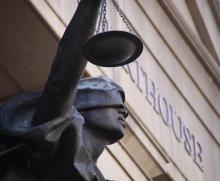
Yesterday, the third Building for Digital Equity livestream of the year brought together policy experts and frontline workers to explore how community-driven connectivity solutions are inextricably tied to building local trust.
If you missed it, the entirety of the hour and 15 minute event can be viewed here.
Hosted by ILSR’s Community Broadband Networks initiative and the National Digital Inclusion Alliance (NDIA), this week’s B4DE served as an unofficial kick-off to Digital Inclusion Week and the variety of events that will mark the occasion in communities across the country.
With each B4DE guest focused on various aspects of the theme, “Moving At The Speed Of Trust,” the event provided attendees a jolt of hope and optimism, even as the world of digital equity has been upended by the demise of the federal Affordable Connectivity Program, the sudden termination of the Digital Equity Act, and numerous other Trump administration policy shifts that will make it harder to bridge the digital divide.
Despite the setbacks and sense of frustration unfolding at the federal level, B4DE shared resources on a number of ways people could get more involved in digital equity work, brought to life by a line-up of speakers and presenters who highlighted local strategies that have proved fruitful in expanding Internet access.
The table was set by Dr. Mariette Ayala, Director of Curriculum And Instruction with TechGoesHome, who opened up the gathering sharing some of her digital equity inspired artwork. (Dr. Ayala comes on at the 10:51 min mark).

That was followed by NDIA Policy Director Amy Huffman providing an update on how states want to use left-over nondeployment funds from the BEAD program and whether or not it appears the Trump administration will allow states to use those funds as the bipartisan infrastructure law that created the program intended. (You can find Amy at the 20:52 min mark).
Jessica Strom, Senior Program Manager with DigitalLIFT in San Antonio, Texas, spoke to how her and her organization’s work in South Texas is fundamentally based on relationship-building, which she emphasized “cannot (be done) without trust – both at an organizational level and when working directly with community members.” (Jessica appears at the 27:00 min mark).
Strom, who had previously been a guest on our Building for Digital Equity podcast, went on to explore why trust-building is not just some soft-skill but a key part of achieving organizational success, noting how DigitalLIFT had to deal with the distrust that was sown by the collapse of federal programs “before we could even get to the (digital) skills or resources that that residents needed.”
Next Brandon Forester, Senior Campaign Lead at MediaJustice, took center screen to spotlight an ugly but not-widely-known truth about households left on the wrong side of the digital divide. (Brandon takes center screen at the 38:49 min mark).
“The most disconnected communities in the United States (are) majority black counties or counties with high black populations in the rural south,” he said, before sharing the story of how MediaJustice went to Utica, Mississippi to help create a coalition that was “built slow, at the speed of trust” to advocate for and shape the state’s broadband expansion plans – a community-driven story captured in the documentary “Deeper Than A Divide.”
The grand finale of B4DE came in the form of a virtual fireside chat with two broadband champions deeply enmeshed in bridging the digital divide in two different underserved rural communities in the south: Wanda Manning of Delta Interfaith in East Carroll Parish, Louisiana and the North Carolina-based Wave7 Communications Founder and CEO LaShawn Williamson. (The fireside chat kicks off at the 50:51 min mark).
Both shared their stories of how they went above and beyond the traditional areas of digital equity work to getting deeply involved in creating structural changes with the building of local networks that aim to liberate their rural neighbors from the grip of unresponsive monopoly providers that have left millions of households across the nation with unreliable, expensive service all while extracting wealth from local communities. And while the networks being built in their communities have met with some success, they are still fighting to finish the job in the face of recent federal program changes that threatens to underinvest in rural communities.
Williamson, however, ended the event with a powerful framing of how she and others should press on in the face of challenges.
"You just do it and do it afraid. And you walk by faith and not by sight. And everything that you need will come into play," she said. "I just challenge anyone who feels like they're supposed to get out there and do something about this, do it afraid. Just get out there and do it. Everything else will fall in place. You don't have to be perfect. You don't have to know it all."
Watch the event in its entirety below:







